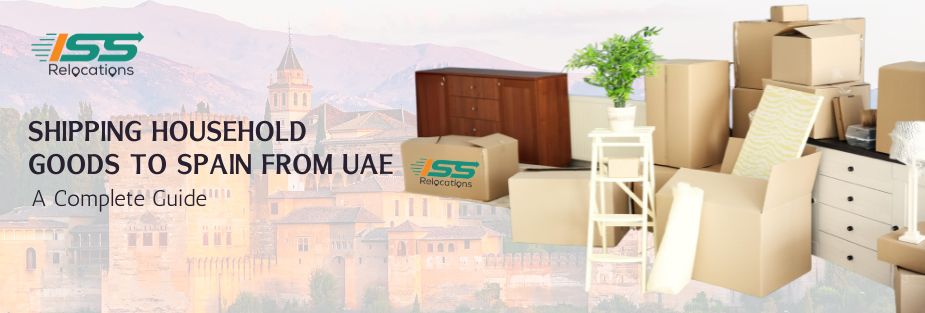
Shipping Household Goods to Spain from UAE: A Complete Guide
Relocating to Spain from the UAE is an exciting journey, but ensuring a smooth transition requires careful planning. Shipping household goods to Spain from UAE involves several steps, including choosing the right shipping method, handling customs documentation, and understanding import regulations. Proper preparation helps avoid unnecessary delays and unexpected costs.
Spain is a popular destination for expats due to its high quality of life, pleasant climate, and vibrant culture. Whether you’re moving for work, retirement, or personal reasons, transporting your belongings efficiently is crucial for a stress-free relocation. Partnering with an experienced international mover simplifies the process and ensures your household goods reach Spain safely.
Shipping Household Goods to Spain from UAE – Understanding the Process
The process of shipping household goods to Spain from UAE involves multiple factors, including shipping methods, transit times, and costs. Understanding these elements helps in selecting the most suitable option based on budget and urgency.
Shipping Methods: Which One is Right for You?
There are different shipping methods available for transporting household goods internationally. The best choice depends on the volume of items, delivery timeline, and budget.
Sea Freight for Cost-Effective Shipping
Sea freight is the most common and economical option for shipping household goods to Spain from UAE. It is ideal for large shipments and offers two types of container services: Full Container Load (FCL) and Less than Container Load (LCL). FCL is suitable for individuals shipping an entire household, while LCL allows sharing container space with other shipments, reducing costs.
Air Freight for Faster Delivery
For those who need urgent delivery, air freight is the best alternative. It ensures household goods reach Spain in a shorter time compared to sea freight. However, air freight is significantly more expensive and is generally recommended for smaller shipments or high-value items.
Land Transport for Specific Cases
While land transport is less common, it may be an option for those relocating from UAE to Spain via other European countries. However, this method is generally used for intra-European moves rather than direct shipments from the UAE.
Estimated Shipping Timeline
The time required for shipping household goods to Spain from UAE depends on various factors, including the chosen transport mode, customs clearance, and port handling.
Sea Freight Transit Times
Shipping via sea freight typically takes between 25 to 40 days, depending on the shipping line, container availability, and final destination in Spain. Delays may occur due to port congestion or customs inspections.
Air Freight Transit Times
Air freight is significantly faster, usually delivering household goods within 5 to 10 days. However, additional time may be required for customs clearance and local transportation.
Customs and Port Processing Delays
Unforeseen delays can arise during customs clearance in Spain. Proper documentation and compliance with Spanish import regulations help expedite the process. Engaging a professional relocation service ensures a hassle-free experience.
Cost Factors to Consider
The total cost of shipping household goods to Spain from UAE varies based on shipment size, transport method, and additional services.
Shipping Volume and Weight
The overall cost depends on the size and weight of the shipment. Sea freight charges are typically calculated based on container size, while air freight is priced according to weight. Reducing unnecessary items can help lower expenses.
Shipping Method Chosen
Sea freight is the most affordable option for large shipments, whereas air freight costs significantly more but offers faster delivery. The choice between FCL and LCL also affects pricing.
Customs Duties and Additional Fees
Import duties, value-added tax (VAT), and port handling charges are additional expenses to consider. Some shipments may qualify for duty exemptions, depending on the nature of the move and the items being transported.
Shipping Household Goods to Spain from UAE?
Begin Your Stress-Free Relocation Journey Today – Request A Quote Now!
Customs Regulations and Documentation
Understanding Spanish customs requirements is essential for smooth clearance when shipping household goods to Spain from UAE. Proper documentation and compliance with import regulations help prevent unnecessary delays.
Essential Documents for Smooth Clearance
Shipping household goods internationally requires specific documents to facilitate customs clearance. The required paperwork ensures compliance with Spanish regulations.
Valid Passport and Residence Visa
A valid passport and Spanish residence visa are required for customs clearance. Non-residents may need additional permits for importing personal belongings.
Packing List with Detailed Descriptions
A comprehensive packing list specifying all items being shipped must be provided. Each item should be clearly described, including its condition and estimated value. This list is crucial for customs inspections.
Bill of Lading or Air Waybill
The Bill of Lading (for sea freight) or Air Waybill (for air freight) serves as proof of shipment. This document includes details such as sender and recipient information, shipment contents, and transport details.
Customs Declaration Form
A customs declaration form is required to declare the goods being imported. This form helps authorities determine whether any taxes or duties apply to the shipment.
Duties and Tax Exemptions
When shipping household goods to Spain from UAE, certain conditions determine whether duties and taxes apply.
Duty-Free Imports for Returning Residents
Spanish citizens and long-term residents returning from the UAE may be eligible for duty-free importation of personal belongings, provided they have lived outside Spain for at least 12 months. The items must be used and intended for personal use.
VAT and Import Duties for Non-Residents
For non-residents, standard VAT and import duties may apply. The applicable rate varies based on the nature of the goods being shipped. Consulting a relocation expert ensures accurate tax estimations.
Prohibited and Restricted Items
Spain has strict regulations regarding prohibited and restricted imports. It is essential to be aware of these rules before shipping household goods to Spain from UAE.
Items Prohibited from Importing into Spain
Certain items are strictly prohibited from being imported into Spain, including narcotics, counterfeit goods, and hazardous materials. Attempting to ship these items can result in legal consequences.
Restricted Items Requiring Special Permits
Some items, such as firearms, plants, and animal products, require special permits for importation. It is advisable to check with Spanish customs authorities for specific regulations.
By following customs guidelines and ensuring all necessary documents are in order, individuals can avoid unnecessary delays and additional expenses. Working with a professional relocation company simplifies the process, ensuring that household goods arrive in Spain smoothly.
Packing and Preparing Your Shipment
Proper packing is crucial when shipping household goods to Spain from UAE. Ensuring your belongings are securely packed reduces the risk of damage during transit and facilitates smooth customs clearance. Selecting high-quality materials, organizing items efficiently, and following shipping guidelines contribute to a stress-free moving experience.
Best Practices for Packing Household Goods
Packing household goods properly ensures they arrive in Spain in excellent condition. Careful planning and attention to detail can prevent breakage and minimize potential issues during transit.
Selecting the Right Packing Materials
Choosing durable packing materials is essential for protecting household goods during shipping. Sturdy moving boxes, bubble wrap, and foam padding help safeguard fragile items. High-quality packing tape and waterproof covers provide extra protection against environmental factors such as humidity and temperature changes.
Organizing Items for Safe Transport
Grouping similar items together simplifies unpacking and prevents damage. Heavy objects should be placed at the bottom of boxes, while delicate belongings require additional cushioning. Clearly labeling each box with its contents and destination room speeds up the unpacking process in Spain.
Securing Fragile and High-Value Items
Fragile belongings, such as glassware and electronics, require special handling when shipping household goods to Spain from UAE. Wrapping breakable items individually and using dividers within boxes reduces the risk of impact damage. Jewelry, important documents, and valuable items should be transported separately or insured for added security.
Choosing a Reliable Shipping Company
Selecting an experienced international shipping provider simplifies the moving process. A reputable company ensures that household goods are transported safely, handled professionally, and delivered on time.
Evaluating Experience and Reputation
An established shipping company with experience in international relocations understands customs regulations, transport logistics, and proper handling procedures. Checking customer reviews and testimonials helps assess reliability and service quality.
Understanding Available Shipping Services
When shipping household goods to Spain from UAE, different service options are available. Door-to-door services provide convenience by handling packing, transport, customs clearance, and final delivery. Port-to-port shipping, while more affordable, requires additional arrangements for local transport upon arrival in Spain.
Considering Insurance and Tracking Options
Comprehensive shipping insurance offers peace of mind by covering potential damages or losses. Shipment tracking services provide real-time updates, allowing individuals to monitor the progress of their household goods in transit.
Door-to-Door vs. Port-to-Port Shipping
Choosing between door-to-door and port-to-port shipping affects the overall moving experience. Each option has distinct advantages and considerations, depending on budget, convenience, and personal preferences.
Door-to-Door Shipping: Convenience and Efficiency
Door-to-door shipping provides a hassle-free experience by managing the entire process from the UAE residence to the final destination in Spain. This service includes packing, loading, transportation, customs clearance, and delivery.
Advantages of Door-to-Door Shipping
Opting for a door-to-door service simplifies shipping household goods to Spain from UAE. Professionals handle every step, ensuring compliance with customs regulations and reducing the risk of delays. The convenience of receiving belongings directly at home eliminates the need for additional transport arrangements.
Considerations for Door-to-Door Shipping
While convenient, door-to-door shipping may involve higher costs due to comprehensive handling services. However, the added benefits often outweigh the expense, especially for those unfamiliar with international shipping procedures.
Port-to-Port Shipping: Cost-Effective but Requires Extra Steps
Port-to-port shipping is a more budget-friendly option, but it requires additional effort to coordinate local transport upon arrival in Spain. This method is best suited for those who have experience managing customs clearance and logistics independently.
Advantages of Port-to-Port Shipping
For individuals prioritizing cost savings, port-to-port shipping offers a more affordable alternative. This option allows flexibility in arranging final delivery while still ensuring that household goods reach Spain efficiently.
Considerations for Port-to-Port Shipping
Shipping household goods to Spain from UAE via port-to-port services requires coordination with local transport providers in Spain. Customs clearance must be handled personally or through a third-party agent, adding extra steps to the process.
Receiving Your Goods in Spain
Once household goods arrive in Spain, the final steps involve customs clearance, local delivery, and ensuring all belongings are accounted for. Understanding what to expect at this stage helps prevent delays and ensures a smooth transition.
Customs Clearance Upon Arrival
Clearing customs is a mandatory step when importing household goods into Spain. Proper documentation and compliance with import regulations facilitate a seamless process.
Expected Processing Time at Spanish Ports
Customs clearance times vary depending on the volume of shipments and the efficiency of processing at the designated Spanish port. On average, clearance takes between 3 to 7 days. Delays may occur due to incomplete paperwork or required inspections.
Handling Customs Inspections and Documentation
Spanish customs authorities may inspect shipments to verify declared contents. Ensuring all required documents, including the packing list and customs declaration form, are accurate reduces the risk of complications. Working with a professional shipping company minimizes potential issues during this stage.
Final Delivery to Your New Home
Once customs clearance is completed, arranging local transportation for household goods is the final step. Depending on the chosen shipping service, delivery may be handled directly or require additional coordination.
Arranging Local Transportation
For those using a port-to-port service, hiring a local moving company ensures household goods reach the final destination in Spain. Door-to-door services include final delivery, streamlining the relocation process.
Ensuring Safe and Complete Delivery
Upon receiving household goods, verifying that all items have arrived intact is essential. Checking against the packing list ensures nothing is missing or damaged. In case of any discrepancies, contacting the shipping provider promptly helps resolve issues.
Shipping household goods to Spain from UAE requires careful planning, efficient packing, and a reliable shipping service. By understanding customs regulations, choosing the right shipping method, and preparing thoroughly, individuals can ensure a successful and stress-free move to Spain.
Common Challenges and How to Overcome Them
Relocating internationally presents several challenges, especially when shipping household goods to Spain from UAE. Understanding potential issues and how to address them helps ensure a smooth transition.
Potential Shipping Delays and Solutions
Delays in shipping can occur due to unforeseen circumstances, including customs processing, weather conditions, and logistical bottlenecks. Proper planning and proactive communication with the shipping provider help minimize disruptions.
Customs Delays and Documentation Errors
Incomplete or incorrect documentation is one of the most common causes of delays when shipping household goods to Spain from UAE. Ensuring all paperwork is accurate, including the packing list, bill of lading, and customs declaration, prevents processing issues. Working with an experienced international mover helps navigate complex customs requirements.
Port Congestion and Transport Delays
High shipping volumes can cause congestion at ports, leading to delays in unloading and customs clearance. Booking shipments in advance and choosing off-peak shipping times can help avoid long waiting periods. Selecting a reliable shipping service ensures timely updates on shipment progress.
Dealing with Customs Clearance Issues
Spanish customs authorities may inspect shipments, especially if items are not declared correctly. Understanding import regulations and ensuring compliance with duty exemptions for personal belongings help prevent unnecessary fines or shipment holds.
Understanding Tax and Duty Regulations
Certain items may be subject to value-added tax (VAT) and import duties when shipping household goods to Spain from UAE. Knowing the applicable tax rates and exemptions for personal effects allows for better cost planning. Providing evidence of ownership, such as purchase receipts for high-value items, helps justify duty-free entry when applicable.
Ensuring Compliance with Restricted and Prohibited Items
Shipping prohibited or restricted goods can result in customs seizures or legal penalties. Items such as weapons, hazardous materials, and counterfeit products are strictly regulated. Checking Spain’s import laws before shipping household goods helps avoid issues at customs checkpoints.
Managing Costs and Unexpected Expenses
Shipping costs can vary based on factors such as fuel surcharges, customs fees, and additional handling charges. Understanding potential expenses and budgeting accordingly prevents financial surprises.
Estimating Total Shipping Costs
Accurate cost estimates depend on shipment volume, transport method, and destination port fees. Comparing quotes from reputable shipping providers ensures competitive pricing. Factoring in potential customs duties, VAT, and local delivery fees provides a clearer picture of the total relocation cost.
Avoiding Hidden Fees and Additional Charges
Some shipping companies may charge extra for services such as packing, storage, or expedited delivery. Clarifying all costs upfront and reading the service agreement carefully prevents unexpected charges. Opting for a door-to-door service simplifies cost planning by including all necessary expenses in a single package.
Wrapping Up
Shipping household goods to Spain from UAE requires detailed planning, from selecting the right shipping method to preparing documentation and navigating customs regulations. Ensuring that all household goods are properly packed, choosing between sea or air freight, and working with a trusted shipping provider helps streamline the relocation process.
Understanding potential challenges, such as shipping delays, customs clearance issues, and unexpected costs, allows individuals to prepare effectively. Opting for a professional international mover ensures that shipments are handled professionally, reducing stress and ensuring a seamless transition to life in Spain.
With the right approach, relocating to Spain can be a smooth and hassle-free experience. Partnering with ISS Relocations guarantees expert assistance, ensuring that household goods arrive safely and on time. Proper planning, organization, and professional support make international moving an efficient and stress-free process.
Plan Stress-free Move with Top Moving Company in UAE - ISS Relocations

Frequently Asked Questions
How long does shipping household goods to Spain from UAE take?
The time required for shipping household goods to Spain from UAE depends on the chosen transport method. Sea freight typically takes between 25 to 40 days, while air freight can deliver shipments within 5 to 10 days. Customs clearance and port handling may add a few extra days to the total transit time.
What is the cheapest way to ship furniture to Spain?
The most cost-effective method for shipping furniture is sea freight, specifically Less than Container Load (LCL) shipping, where multiple shipments share a container. Full Container Load (FCL) is another economical option for large household moves. Choosing a reliable international mover helps optimize costs and ensures a smooth shipment process.
Are there any customs duties when moving personal belongings to Spain?
Customs duties may apply depending on residency status and the nature of the shipment. Returning Spanish residents who have lived outside the EU for at least 12 months may qualify for duty-free importation of personal belongings. Non-residents may be subject to value-added tax (VAT) and import duties based on item classification.
Can I ship my car along with my household goods to Spain?
Yes, it is possible to ship a car along with household goods when relocating to Spain. However, vehicle import regulations require compliance with Spanish roadworthiness standards, emissions laws, and tax requirements. Additional documentation, including proof of ownership and insurance, is required for customs clearance.
What should I do if my shipment is delayed at customs?
If a shipment is delayed at customs, contacting the shipping provider or customs broker helps determine the cause of the delay. Ensuring all required documents are in order and complying with customs regulations minimizes processing time. In case of an inspection, being prepared with necessary documentation facilitates a quicker resolution.
Is international shipping insurance necessary for household goods?
While not mandatory, international shipping insurance is highly recommended when shipping household goods to Spain from UAE. Insurance coverage protects against potential damages, loss, or unforeseen circumstances during transit. Opting for comprehensive insurance ensures financial security and peace of mind throughout the relocation process.
Moving Company - Recent Blog
Stay informed and prepared for your next move with our latest blogs on moving services in the UAE. From expert packing tips to international relocation guides, ISS Relocations brings you up-to-date insights to make your moving experience smoother, safer, and stress-free.










